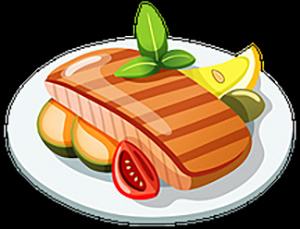
It’s fun to go out for Shabbos meals, because it allows you to sit and talk over food, which, as you’ve learned on shidduch dates, is great, because if the conversation goes bad, you can always talk about the food. But how do you end the conversation? Most people don’t know. They try serving dessert, but then after dessert they can still end up talking for hours, and the kids are climbing the walls and the husbands are missing their naps, and there has to be a way to end this.
Wait, we can sing Shir Hama’alos!
Arguably, that’s why it was invented.
But even after everyone gets up from the table, it can keep going. Even opening the front door doesn’t help. And these are great people and all, but you only get one day to sleep, or learn with your kids, or do whatever it is you do on a Shabbos afternoon for like seven hours.
So most people, when they’re looking for a closing line to signify that they’re leaving, say, “Everything was delicious.” Even if it’s not connected to what you’ve just been talking about for an hour. And only guests can say that. You don’t get to say it, as a host. Your wife will just say, “Thanks,” and keep talking.
But when you say it as a guest, you’re clearly wrapping it up, like, “Let’s end this. So everything was delicious, as we said when you were serving it…” and the hosts are like, “They’re repeating themselves; I guess we’re out of conversation.”
You’re playing yourselves out.
You mean it as a compliment. But it sounds very fake, because everyone says it. And you’re halfway out the door. And you say it even if everything wasn’t delicious. Like if they burned something, and you weren’t saying anything at the time because you didn’t want to upset them, and they already apologized for it. And now you’re like, “Everything was delicious… Whoops! I mean except the chicken.”
So saying, “Everything was delicious,” is kind of fake. Especially if you didn’t say it at the table. Why are you bringing up the food now? Can you at least be specific about what was delicious? Also, why are you complimenting the food but not the conversation or the singing? Thanks a lot. Maybe you should say, “Anyway, the singing was lovely…”
In fact, maybe by saying, “Everything was delicious,” you’re actually saying that the singing wasn’t good. Or that their kids aren’t cute. Or that the d’var Torah was word for word what the rav said in shul.
So “Everything was delicious,” is just the code to get out of the house. If you’re looking for way to believably compliment the food, you can try taking seconds. And then the hosts will think, “Oh! He really likes that!” or they’ll think, “Boy, did he not eat yesterday?”
So what some people do if they want to compliment the host—and what I started doing—is I pick one specific food that I liked and ask about it: “Can I have the recipe for the kugel? You have to send me the recipe.” People say that, like, “You had me over, you introduced me to this kugel, and now you have a social obligation to tell me how to make it.” But it’s a sincere a compliment. You know they liked it, because they didn’t have to ask that. Or else they’re trying to make boring conversation. Like the conversation was so bad that they’re trying to liven it up by talking recipes. I enjoy cooking, but there are few things more boring than hearing a recipe in detail when you can’t even write it down.
So I definitely recommend asking for a recipe. You don’t even have to eventually make the recipe. They won’t wonder about it if you don’t make it the next time they come to you, because they’ll figure, “Why would they make that food for us if we’re the ones who showed them the recipe?”
Sure, you can just say, “The kugel was good,” but then it will be conspicuous that you didn’t say that about everything else. If you’re asking for a recipe, you don’t have to worry that they’ll wonder why you didn’t ask for the recipe for everything. There’s only so much you can hold in your head. And you really can’t ask for every single recipe anyway, or you’ll be asked to leave. “What, are you opening a restaurant?”
But hosts definitely take recipe requests as a compliment. It means that your guest is sitting there, thinking, “This is a good kugel. I would like to make this kugel at home so that I could eat it without having to go to these people’s houses. No offense.”
But at least they like the food. Or maybe what they want is to be able to make it for their company, and everyone’s going to compliment them on it, and they’re not even going to do it b’sheim omro. They’ll just take credit. And then their guest will come to your house on a later occasion and you’ll make the kugel and take credit for it, and they’ll be like, “This is the same kugel that other person made.”
So what I like to do is, when I’m telling them the recipe, I leave out one key step or ingredient. That way, their guests can taste it and think, “It tastes okay,” and the hosts will go, “I don’t know what’s wrong with it. It was so good when we ate it at the Schmutters’ house.” And then they mention my name.
And then their guests will be like, “Let’s go to the Schmutters’ house.”
By Mordechai Schmutter
Mordechai Schmutter is a freelance writer and a humor columnist for Hamodia and other magazines. He also has six books out and does stand-up comedy. You can contact him at [email protected].













